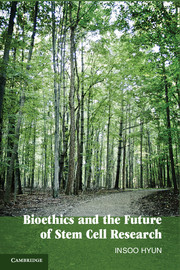6 - The Limit Case
Acute Human/Nonhuman Neurological Chimerism
Published online by Cambridge University Press: 05 May 2013
Summary
Acute human/nonhuman neurological chimerism arguably might yield the most scientific utility if it is produced in large animal species that are already physiologically very similar to human beings. In view of this supposition, some may propose that the biologically ideal species for acute neurological chimera studies are large old-world monkeys and great apes. Their genetic proximity to us, larger cranial capacities, and more humanlike developmental rates might all better accommodate the chimeric development of a functional human brain–like architecture and thus could pose significant advantages over the use of small animals. It is for much of these same reasons, however, that many people are uncomfortable with the prospect of this type of chimera research. The fear is that acute neurological chimerism in nonhuman primates might render them not only much more biologically like us, but also far more morally comparable. In this chapter I explore these and other ethical concerns.
Others have written on the issue of acute human/nonhuman neurological chimerism, but none has analyzed this topic in the manner that I do in the following text. Phillip Karpowicz and colleagues (2004, 2005) argue that such experiments should be allowed, but only under the following conditions: (1) limiting the number of human cells transferred to the fewest necessary to achieve the research aim; (2) limiting the choice of host animal to the least morphologically and functionally related to humans as possible for the study; and (3) using only dissociated human cells, rather than postanatomical tissue transplants, in developing embryonic chimeras. Robert Streiffer (2005) recommends an early termination (abortion) policy on acutely chimeric human/nonhuman embryos before the formation of a cognitive system, or, in the absence of such a policy, a restriction on the transfer of human pluripotent stem cells into early stage developing animals.
- Type
- Chapter
- Information
- Bioethics and the Future of Stem Cell Research , pp. 130 - 154Publisher: Cambridge University PressPrint publication year: 2013
- 1
- Cited by



